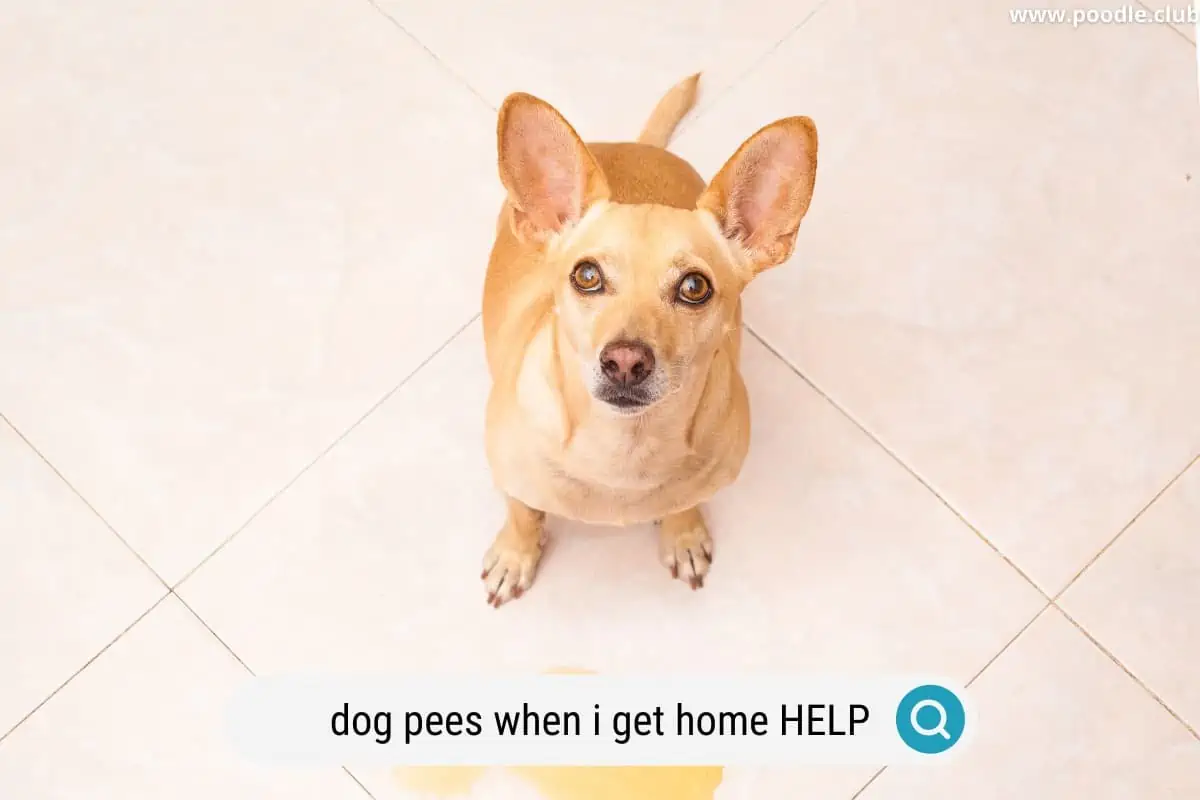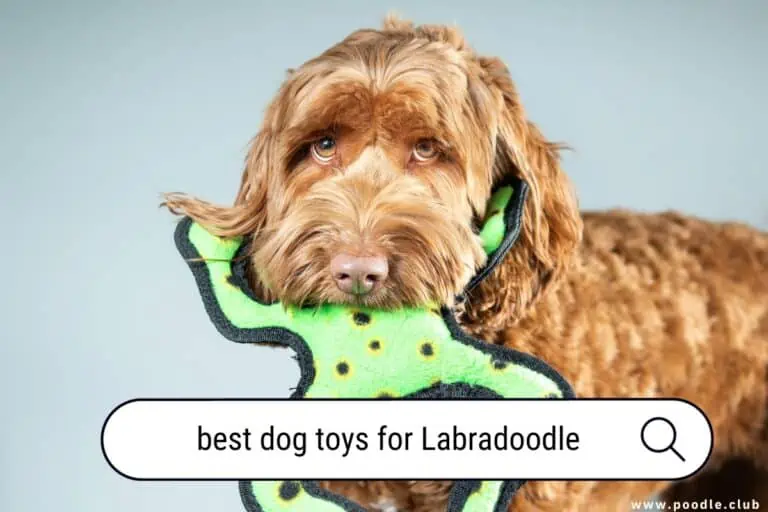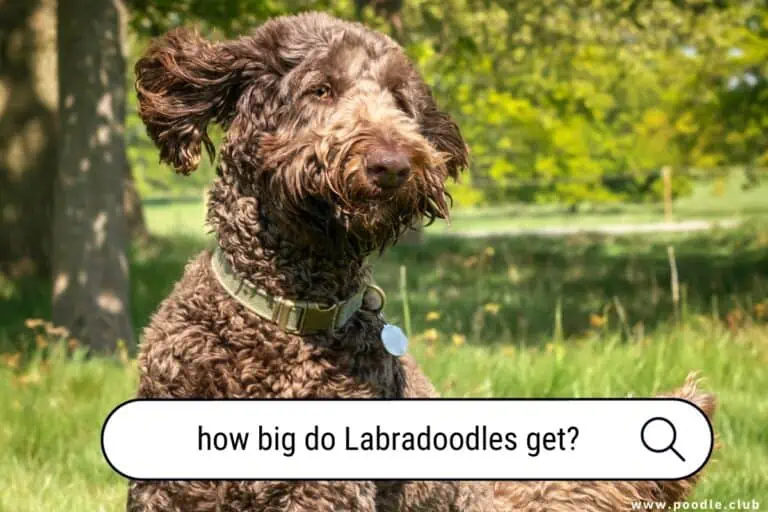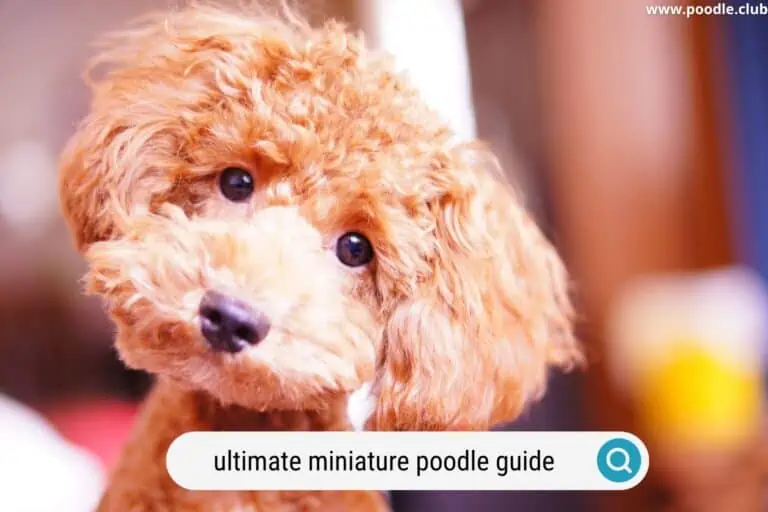Why Does My Dog Pee When I Come Home? (Solutions)
You recently adopted a pup and already love your dog. But your dog always seems to urinate when you arrive back home.
So you ask yourself, “why does my dog pee when I come home?” A dog can pee when seeing their people for a few reasons.
Keep reading to learn more and uncover some possible solutions.

Why Dogs May Pee When You Come Home
It can be frustrating if your dog always pees when you come home. You may feel like you can never leave them alone.
However, you can’t fix the problem if you don’t know the cause. Consider the following reasons why your dog pees when you get home.
Excitement Urination
Some dogs pee when they get excited, which can happen when they see their people. You should consider your dog’s stance and body language. If it looks happy and playful, there’s a good chance it’s peeing due to the excitement.
The dog may jump on you, spin around, or otherwise get physically active. If you live with other people or have visitors, your dog might also pee when it sees others.
PuppySpot is a reputable dog marketplace where you can browse and find compatible puppies right from the comfort of your home. They have placed over 200,000 puppies into homes in the US!
Excitement urination is particularly common in puppies and younger adult dogs. Most of the time, the dog will outgrow this habit. Unfortunately, some dogs may not outgrow it without the proper training or treatment.
Submissive Urination
Submissive urination happens when a dog is nervous, shy, or anxious. Instead of being excited to see you, your dog might act timid, which can cause them to lose control of their bladder. A submissive dog may also pee to show you it knows you’re the dominant one.
This type of urination tends to happen when strangers or visitors greet the dog. However, it could happen for a while after you adopt a new pet. Common signs of this type of urination include tucking their tail between their legs, looking away, and pulling their ears back.
Dogs of all ages can experience submissive urination, but it may be more common in female dogs. The dog’s life experiences may also play a role. For example, if your dog was abused in a previous home, it might continue to pee when you get home, even if you never hurt them.
Medical Conditions
If your dog starts to pee when you get home all of a sudden, it could be due to excitement or submission. However, something more serious may be going on. Some medical conditions that can cause excessive urination include the following:
- Urinary incontinence
- Urinary tract infection (UTI)
- Diabetes
- Kidney disease
- Gastrointestinal problems
- Medications with urination as a side effect
Of course, if a medical condition is to blame, your dog may pee whenever. However, the urination may coincide with when you arrive back home.
Your dog may have a medical condition as a puppy or develop one as an adult. If you notice your dog pees when it shouldn’t, even when you’ve been home, keep an eye on them. There’s a chance their issue has nothing to do with excitement or submission.
How To Keep Your Dog From Peeing When You Get Home
If you notice your dog peed when you got home, you’ll need to clean it now. Luckily, you may be able to decrease the chances of the issue happening again.
Depending on the cause of your dog’s urination, you can do a few things to help. Keep the following things in mind to help keep your dog from peeing when it sees you come home.
Schedule a Vet Visit
First, you should take your dog to the vet to receive an exam. A vet may diagnose your dog with an underlying medical condition. They can also review the medications your dog currently takes and tell you if any of them cause excess urination.
If the problem is medical, your vet can prescribe medication or another treatment. Then, you may notice your dog no longer pees when you get home. When a medication side effect is the problem, the vet could prescribe a new medicine.
However, a vet may also be able to tell you that your dog is healthy. They may ask you some questions to help you determine if the dog is experiencing excitement or submissive urination.

Give Them More Potty Breaks
When possible, give your dog more chances to go outside and urinate where it’s supposed to. Try to do this before you leave the house, especially if you’ll be gone all day. You should also give them a chance to urinate before bed.
If you come home for a quick lunch break, let your dog out then as well. That way, it won’t have as full of a bladder when you finish the entire workday.
When you’re out of town, ask a friend to stop by your house often. They can let your dog out to urinate as frequently as necessary. Ask your friend to do this a few hours before you expect to get home so your dog won’t experience excitement urination.
Set up a Crate
Especially when you have a puppy, you may want to leave them in a crate when you’re gone. The kennel will keep the puppy in place when you arrive. Sometimes, running up to you makes your dog lose control and urinate.
You can get home, set your stuff down, and settle in for 15 minutes or so. Then, you’ll be able to open the crate and let your puppy run throughout the house. It may have calmed down in that time, so the chances of the pup peeing are small.
Maybe you want to give your dog more room to move around when you’re gone, so you put up a baby gate. That way, you can keep the dog in your kitchen or another small room. Do the same thing when you arrive, though, and don’t let them out until it calms down.
Ignore the Peeing
You may want to react when you get home and see your dog pee. Your gut might tell you to punish your dog or make it feel bad. However, that can make your dog feel worse, especially if it has submissive urination.
On the other hand, you don’t want to comfort the dog either. That can make the dog feel more excited, which is a problem if it experiences excitement urination.
Instead, don’t say or do anything to your dog. Grab some cleaning supplies and wipe up the mess as peacefully as possible. This can show your dog that it’s not a big deal, keeping them from getting nervous the next time you come home.
Use a Calm Greeting
Ideally, you wouldn’t greet your dog when you come home, particularly if it pees. But you may want to interact with your pup a little bit. If you wish to do so, you need to be careful with your actions.
Rather than talking to them excitedly, don’t say anything. Instead, you can throw your dog a treat that it can run after and enjoy. Another option is to throw your dog their favorite toy so it can get their excitement out healthily.
If you must touch your dog, do so under its chin. When you pet the top of their head, you can make them feel more submissive, leading to submissive urination. So bend down to meet their level and calmly pet them when you get home.

Work on Confidence
When you have a dog that struggles with submissive urination, you should work on its confidence. You can do this in a few ways, such as by enrolling them in an obedience class. Both you and your dog will learn new tricks and training techniques.
Another option is to socialize your dog with other dogs outside of a class. The dog can get to know others and start to play with the dogs it meets.
Training your dog can help strengthen your bond, which may help with submissive urination. It could also help minimize excitement urination, especially if you train your dog to be calm when it first sees you.
Why Does My Dog Pee When I Come Home?
Long-time dog owners have probably wondered, “why does my dog pee when I come home?” Dogs can urinate when they see you for many reasons.
Sometimes, it’s as simple as a medical condition. However, your dog may urinate because it’s excited or knows you’re the boss. Be sure to take them to the vet and work on some training exercises to reduce the chances of your dog peeing inside again.





![Labradoodle Bite Force [Stats] Exploring the Strength of their Jaws](https://poodle.club/wp-content/uploads/2023/11/labradoodle-bite-force-768x512.webp)

